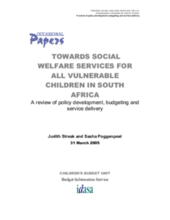The purpose of this paper is to investigate and help shed light on what progress has been made in the social development sector - besides the payment of social grants - to advance the rights of vulnerable children in South Africa. More specifically, it focuses on those programmes and interventions that may be grouped together under the term ‘social welfare services.’ The kind of services that traditionally form part of this area of work include, to name but a few examples, interventions (including children’s court services) where children are victim to or at risk of abuse, neglect or exploitation, the running of children’s homes, the provision of early childhood development, adoption services, services to provide assistance to children living and/or working on the street, foster care placement and care for children affected by HIV/AIDS. The services under the spotlight in this paper are critical because they represent some of government’s main strategies and actions (delegated to the departments of social development) to provide protection and care for the most vulnerable children in our society.
The approach adopted in this paper is to provide an overview of government policy and budgeting for social welfare services, also highlighting some of the current obstacles to service delivery. Then, to use this overview as a basis for drawing out key challenges that need to be addressed so that all vulnerable children gain access to the social welfare services which they need and to which they are entitled. While children are the primary focus of the paper, it is important to recognise that they form part of families and communities. Their rights and needs cannot be understood in isolation. It is also impossible to access budget data on social welfare that is child-specific. So while children represent a special interest throughout the paper, the discussion is framed by the more general context of social welfare services.
©Institute for Democracy in South Africa (IDASA)

